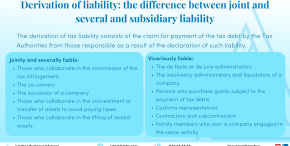![]() By knowing how to invest in foreign markets via the application of Spanish International Investment Company status (ETVE), investors benefit from advantageous tax exemptions. Learn how establishing a holding company in Spain with several international dependent subsidiaries abroad can prove to be a wise and safe business investment.
By knowing how to invest in foreign markets via the application of Spanish International Investment Company status (ETVE), investors benefit from advantageous tax exemptions. Learn how establishing a holding company in Spain with several international dependent subsidiaries abroad can prove to be a wise and safe business investment.
Entidades de Tenencia de Valores Extranjeros – ETVE – explained
Index of contents
In Spain there is a special tax regime for Spanish International Investment Companies (ETVE) The ETVE regime has been successfully facilitating foreign investment in Spain since 1995, providing a tax-efficient structure to allow businesses to invest in foreign markets. International investment schemes register as Spanish ETVEs in order to take advantage of the treaty networks that Spain has with many Latin American companies, combined with the protection afforded by being a member state of the European Union.
Background information about ETVE
The ETVE regime was created in Spain in 1995 with the aim of avoiding international double taxation, and thus to have a similar regime favorable to other EU countries such as Luxembourg, Holland, Switzerland, Denmark, Ireland, Sweden. The main attraction of this corporate structure is based on the tax exemption of dividends as well as the sale of shares to a third party/investor. The ETVE regime is regulated by law 27/2014 on Spanish Corporate Tax and Spanish Royal Decree 634/2015, dated July 10th.
What is the corporate purpose of the holding company?
When explaining the corporate purpose of a holding company that adheres to the Spanish International Investment Companies regime (ETVE), the clearest way of describing their objective is to hold and manage the shares of companies (called subsidiaries/dependent companies) in national or foreign countries. These holding companies are classified as having an economic activity that fits into category 6420 of the CNAE – the Spanish National Classification of Economic Activities. As explained in INE, this class includes the activities of holding companies, i.e. units that hold the assets (owning controlling levels of equity) of a group of subsidiary corporations and whose principal activity is owning the group. The holding companies in this class do not provide any other service to the businesses in which the equity is held, i.e. they do not administer or manage other units.
At Leialta we find that the most common services of holding companies that we advise are the provision of administrative, accounting, tax and legal services from such holding company (a centralized corporate structure) to the subsidiaries (national and foreign companies).
How does a Spanish resident holding company operate?
Holding companies in Spain must operate by clearly providing services in line with their corporate purpose. This entails having employees with labour contracts that identify the service they provide to the group, be it legal, administrative, financial, accounting or tax advice. These employees, working at the premises of the holding company in Spain, will be responsible for centralizing a business structure at an international level, ensuring that they have common guidelines for all companies, in terms of management.
Among other tasks, one important operation carried out is to charge the labour costs of running the holding company back to the subsidiaries who form a part of the holding. Therefore, subsidiaries cover the cost of being a member of a holding company in accordance to an agreement which could be based on margins, mark-ups for time invested or allocated to the subsidiary by such holding company.
What type of holding company should a foreign investor in Spain set up?
The type of company that a foreign investor needs to establish in order to create a holding company in Spain is indifferent. It can be either a public limited liability company (SA) or a private limited liability company (SL). The subsidiaries that form the holding company are then established or included therein by means of a corporate legal operation. Such operation is tax exempt as the share capital of the subsidiary in the holding company is a non-monetary contribution.
The tax advantages of foreign investment via a Spanish holding company
Under the ETVE regime, Spanish international investment holding companies can distribute dividends from subsidiaries in a tax-free manner.
The sale of the shares (or a % of the shares) of any subsidiary will be tax exempted from taxation at holding company level. For example, capital gains tax from the sale of any subsidiary will not be taxed at the holding company. This is provided that the dependent company is not based in a tax haven and belongs to a similar taxation regime as Spain.
Furthermore, any dividend or capital gain may be used to refinance other entities abroad, to finance new companies, develop a new activity, acquire new assets or to invest in the holding company itself.
Dividends or capital gains in a Spanish holding company are safe because there is no risk involved in the activity the holding company undertakes.
Thus, foreign investment via a Spanish holding company protects a business. Any cash surpluses or dividends can be repatriated, and so forth. In other words, funds can be repatriated abroad from Spain via dividends or redemption. Therefore, dividends paid by Spanish companies to their subsidiaries are exempt from withholding tax and are also not taxable in Spain. The same applies to dividends distributed by an ETVE to its non-resident shareholders.
Requirements to be met in order to gain tax advantages as a Spanish holding company
- All foreign subsidiaries managed by the holding company must be subject to corporate income tax in the country of residence. This tax system must be similar to or the same as Spanish Corporation Tax. Thus, any subsidiary based in a tax haven is excluded from benefitting from ETVE status.
- The subsidiary businesses within a holding company must be active, otherwise they will be considered as mere asset-holding companies.
- The holding company must hold a minimum of 5% of the share capital of the dependent companies and subsidiaries.
- This 5% shareholding must have been held for 12 months or shown to be assigned as such for an uninterrupted subsequent period of 12 months.
- Holding companies in Spain must receive approval from the Spanish Tax Authority before being granted ETVE status, as stipulated in article 130 of Spanish Corporate Tax Law 27/2014. If granted, the ETVE regime for the Spanish international investment company will begin in the following tax quarter from notification.
Operational advantages of a holding company
- A holding company for international investment based in Spain benefits from centralized management organization.
- There is an international structure with common guidelines that is managed from the holding company
- A holding company will help avoid conflicts of interest between family and business assets. It acts as a good firewall that facilitates business continuity because it owns shares in the subsidiaries and makes decision about them from within.
Leialta helps individuals and companies invest in foreign markets
The advantages of investing via an ETVE structure that benefits from being in a double tax treaty jurisdiction, complies with EU criteria and is thus protected by EUR Directives including the Parent-Subsidiary Directive and the Merger Directive, are very clear. Leialta, as trusted business consultants, provide comprehensive investment advice on the tax advantages mentioned in this post.




Hi, I´ve a holding company in my group of companies in Spain, and I want to sell some shares, how is the sale of shares taxed? Best regards
Hello Marcos,
In Spain, the sale of shares is considered a capital gain or loss, and is taxed in the savings base of the Personal Income Tax.
The capital gain is calculated as the difference between the sale price and the acquisition price of the shares, adjusted for any improvements and expenses incurred during the holding period.
It´s important to note that there are certain tax exemptions and deductions in Spain for the sale of shares. For example, if the capital gain is reinvested in a new business activity, a 100% income tax exemption can be applied. There are also tax deductions for capital losses. Best regards